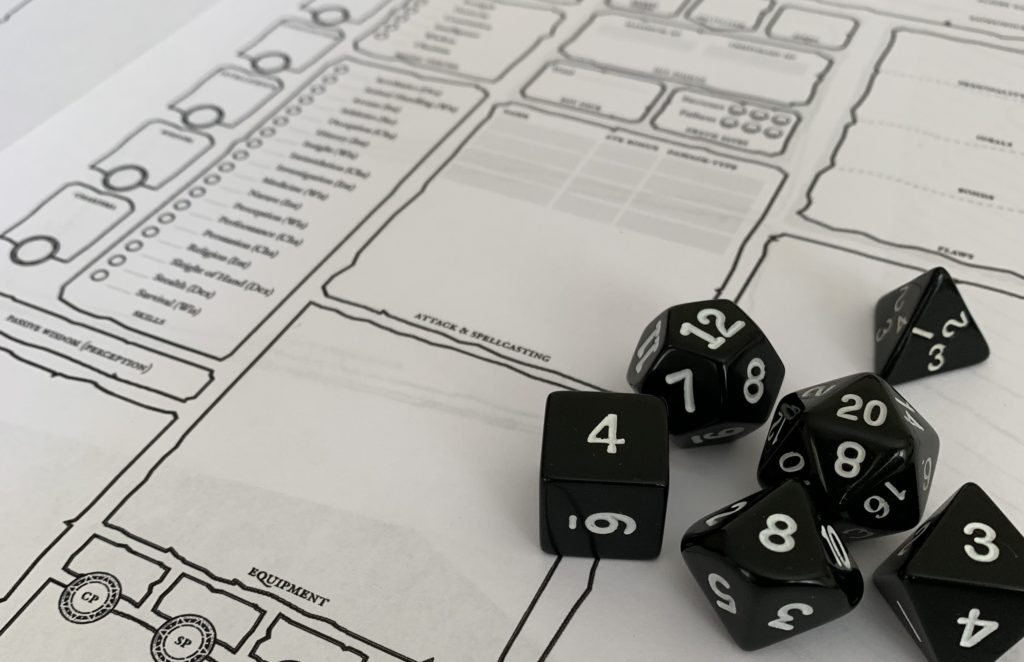D&D Pre-Game Checklist for Beginners

This week we have a guest post from Ted Cory from SkullSplitterDice.com.
To anyone looking to start playing, or hoping to get back into the game, feel relief knowing this is the perfect time to get into Dungeons and Dragons. In fact, mainstream media loves discussing the uncanny resurrection of dungeons and dragons. To those of us already familiar with D&D, we’re not quite as shocked by it’s rising popularity, though we are definitely rejoicing. Dungeons and Dragons has remained a powerful force in the genre of role-playing games since its first publication in 1974. You can find countless online streamers broadcasting their dungeons and dragons campaigns on websites like youtube and twitch. Anyone familiar with writer Dan Harmon may know of his popular show HarmonQuest, an ongoing tabletop RPG campaign that’s animated and released online. Heroes and Halfwits is another popular show that chronicles the Rooster Teeth staff on their Dungeons and Dragons adventures. If you’re just getting started, or coming back to the adventure, then you’re joining a trend that’s only bound to continue growing.
D&D is a collaborative storytelling experience. To better assist in collaborating and creating the story of your journey, you must come prepared to do your part. Thankfully, DnD requires very little tools for a successful rpg campaign. Unfortunately, this makes it even more embarrassing when someone forgets their tools at home and are unable to keep-up with the pace of the group. What you’re expected to bring may vary between campaign groups, so make sure to ask your DM (Dungeon Master) what they expect before your first day. Personally, I like to keep it safe and always bring these three items:
1) Paper and Pencil
Campaigns can be fast-paced and ever changing, so it’s vital to have your tools and wits about you through every turn of the journey. It’s important to have paper and pencil ready for any changes to your inventory, character, or abilities. Some DMs provide paper and pencils for the group no problem, while others expect for you to come with supplies. Have scrap paper ready to quickly record any important information you don’t want to forget during gameplay. You’ll never know when paper and pencil may be useful to draw a battle strategy, map an area, or write a private message to another character. If you want brownie points for being an awesome player, take notes of the questions you ask while learning to play. As you continue to learn, other players should be patient and helpful while you ask questions. I’m sure they will appreciate it if you take time to write down their answers with pencil and paper.
If you enjoy notetaking and won’t find this to be difficult, keep an open mind about roles you can play further down the campaign. Some groups have a self-proclaimed “Scribe” who will record what happens during each session so the group won’t forget what happens during the quest. Over time, you can can build a collection of notebooks mapping out key points and fun memories from your noble adventure.
2) Dice
Dice are the most fundamental tool required to play Dungeons and Dragons. Your dice are the very forces guiding success on your journey, so come ready to fight! A basic DnD campaign game requires a set of 7 differently sided dice to appropriately play the game.
If you’re still looking for a set, SkullSplitterDice.com offers a colorful variety of themed plastic and metal dice for your campaign. While playing in-game, it’s important to choose the correctly sided dice for the appropriate roll. For example, if an ability is measured between 1-7, you are required to roll a d7 for that ability.
Take time before each game and organize your dice (to save time for everyone). Review your character sheet for any recurring abilities you may use and set the appropriate dice aside in advance. If there are times you’re not sure what to do, or which dice to roll, never feel afraid to ask.
3) Character Sheet
There is no greater sin than forgetting your character sheet at home. Always, always, ALWAYS bring your character sheet to every game. An official character sheet informs the DM, and yourself, of the logistical information pertaining to your character. Playable actions related to the game and your character will require information documented on your character sheet. If keeping track of important items isn’t your strong point, no shame, some DM’s will gladly hold onto your character sheet for you.
Take some time before every game to review your character’s skills, abilities, and personality. You’re not expected to have the entirety of your character’s personality mapped out the very first day. That being said, there’s nothing worse than a character without rhyme or reason behind their decisions. DnD is a rich storytelling game, so dive deep to explore your character’s motivations and history. What has happened to your character? How does their race or class affect their actions and motivations? Make a list of your character’s likes, dislikes, and what drives them throughout their quest.

Preview of custom Seas of Vodari character sheet for 5e.
Always Remember
Always remember that your group chose to meet up for DnD to enjoy this journey together, no matter the hardships of your current quest! Take time to stop and appreciate this get together, even if the campaign holds high stakes, because you’re surrounded by friends. Look for ways to make it more fun! Don’t be afraid to bring delicious food and snacks to share – that’s the best way to prepare for an excellent D&D campaign (and make fast friends!)
About the Guest Author
Ted Cory is Chief Adventurer at SkullSplitterDice.com and have been playing tabletop games since 1992. He currently lives and games in Saint Petersburg, Florida.



